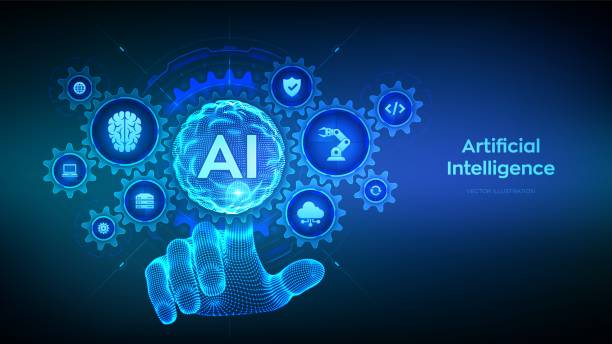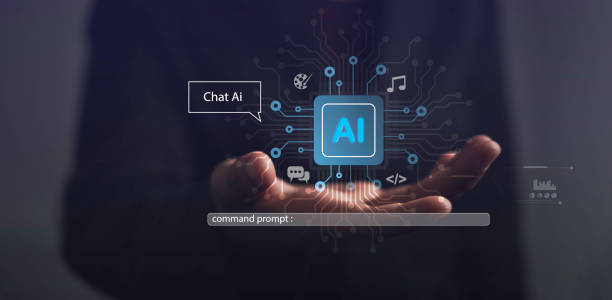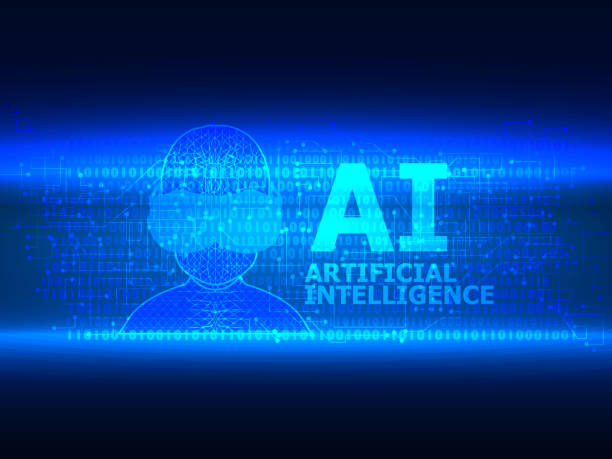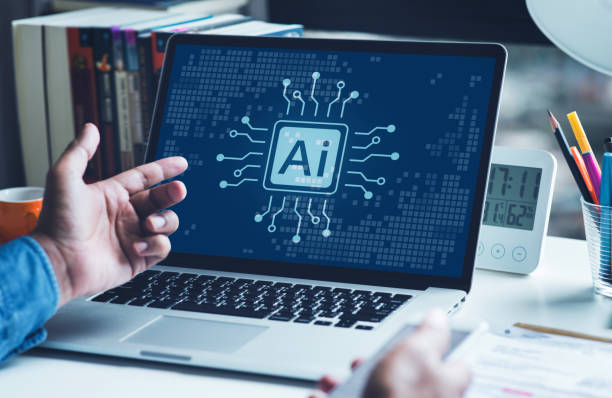Getting to Know the World of Mobile AI Applications

In today’s world, #Artificial_Intelligence is rapidly advancing, and mobile AI applications, as one of the most significant manifestations of this progress, play a crucial role in our daily lives.
From voice assistants to photo and video editing programs, mobile applications equipped with AI have become increasingly accessible and practical.
This introduction will help you become familiar with the concept of mobile AI applications and gain a better understanding of their uses.
A mobile AI application is essentially a program installed on mobile devices that uses artificial intelligence algorithms and techniques to perform various tasks.
These tasks can include facial recognition, language translation, music or movie recommendations, answering questions, and many more.
The primary goal of these applications is to facilitate and improve the user experience by leveraging the power of artificial intelligence.
The benefits of using mobile AI applications are vast.
For example, these applications can provide personalized suggestions by analyzing user-collected data, helping them make better decisions.
Also, AI applications can help improve productivity in work and life, for instance, by automating repetitive tasks or offering optimal solutions to problems.
However, using mobile AI applications also comes with challenges.
Concerns related to privacy, data security, and the misuse of personal information are among the most important of these challenges.
Therefore, developers and users must pay attention to these issues simultaneously to benefit from AI and prevent its potential risks.
Are you bothered by losing customers who visited your site to make a purchase?
Rasav, your specialized solution for a successful online store.
✅ Significantly increase your online sales
✅ Build trust and professional branding among customers⚡ Get free consultation from Rasav experts!
Amazing Applications of Mobile AI Applications

Mobile AI applications are no longer limited to a few specific cases and have diverse applications.
From #Health and #Treatment to #Education and #Entertainment, these applications are constantly changing and improving our lives.
In this section, we will explore some of the most important and engaging uses of mobile AI applications.
Health and Treatment: AI applications play a significant role in health and treatment.
For example, there are applications that, using machine learning algorithms, can diagnose disease symptoms and help users in early disease detection.
Additionally, there are applications that help users manage chronic diseases like diabetes and high blood pressure by providing personalized programs.
Education: AI applications also have numerous uses in education.
These applications can help students learn material better and faster by providing personalized educational content.
Furthermore, there are applications that can help users learn new languages using speech recognition technology.
Entertainment: AI applications are also very popular in the field of entertainment.
From photo and video editing apps to music and art generation apps, these applications allow users to showcase their creativity and experience entertaining moments.
Mobile AI applications help users save time.
Business: Mobile AI applications also significantly assist businesses.
From customer data analysis to automating marketing processes, these applications enable businesses to make better decisions and increase their productivity.
Choosing the Best Mobile AI Application: Key Tips

Given the wide variety of mobile AI applications, choosing the best option can be challenging.
In this section, we will discuss key tips that will help you select an application that best meets your needs.
The most important factor is your personal needs.
First and foremost, determine what type of application you are looking for and what your expectations are from it.
Are you looking for an app to improve your productivity, or an app for entertainment and leisure?
In addition to personal needs, the features of the application are also very important.
Look for an app that has an easy and user-friendly interface and offers all the features you require.
Also, pay attention to the reviews and ratings of other users.
User reviews can provide useful information about the quality and performance of the application.
Security and privacy are also among the most important factors to consider.
Before installing any application, ensure that its source is reputable and carefully review the app’s access permissions.
Avoid installing applications that request access to unnecessary information.
Finally, remember that no application can be entirely flawless.
Therefore, before making a final decision, try out several different applications and choose the one that best suits your needs and preferences.
| Feature | Description |
|---|---|
| User Interface | Easy and user-friendly |
| Features | Full provision of required features |
| User Reviews | Check reviews and ratings of other users |
| Security | Ensure the app’s source is reputable and review access permissions |
Developing Mobile AI Applications: Challenges and Solutions

Developing mobile AI applications is a complex and multifaceted process that requires knowledge and expertise in various fields.
From data collection and preparation to designing and implementing AI algorithms, each stage of this process comes with its own specific challenges.
One of the most significant challenges is the scarcity of sufficient and high-quality training data.
AI algorithms require large volumes of data to learn and improve their performance.
Therefore, collecting and preparing appropriate data can be time-consuming and costly.
Another challenge is the hardware limitations of mobile devices.
Mobile devices typically have limited processing power and memory.
Therefore, developers must design AI algorithms in a way that allows them to run efficiently on these devices.
Furthermore, energy consumption is also an important factor.
AI applications usually have high energy consumption due to heavy computations.
Thus, developers must strive to minimize the energy consumption of their applications.
To overcome these challenges, developers can use various solutions.
For example, they can use transfer learning techniques to leverage existing data for training their AI models.
Also, they can employ algorithm optimization techniques to improve the performance of their applications.
Furthermore, using mobile AI development platforms and tools can help accelerate the development process.
These platforms and tools typically offer diverse features and services that enable developers to easily develop mobile AI applications.
Mobile AI applications possess many capabilities.
Are you bothered by losing customers who visited your site to make a purchase?
Rasav, your specialized solution for a successful online store.
✅ Significantly increase your online sales
✅ Build trust and professional branding among customers⚡ Get free consultation from Rasav experts!
Privacy and Security in Mobile AI Applications

With the increasing use of mobile AI applications, concerns regarding privacy and data security have also grown.
These applications typically access large amounts of users’ personal information, including location data, contact information, financial details, and so on.
Therefore, maintaining the privacy and security of this information is of paramount importance.
One of the most significant risks is the misuse of users’ personal information.
This information can be used for various purposes, including targeted advertising, discrimination, and even fraud.
Another risk is unauthorized access to users’ personal information.
Hackers can gain access to users’ personal data by penetrating AI application systems and misuse it.
To counter these risks, developers must consider appropriate security measures.
For example, they should use strong encryption to protect users’ personal information and employ robust authentication methods to prevent unauthorized access to their systems.
Users must also take necessary precautions to protect their privacy and security.
For example, they should carefully review app access permissions and avoid installing applications that request access to unnecessary information.
Additionally, they should use strong and unique passwords for their accounts and refrain from sharing their personal information with unknown individuals.
Mobile AI applications are very widely used today.
Finally, it is necessary to establish stricter laws and regulations regarding the protection of privacy and data security in mobile AI applications.
These laws and regulations should be designed to both protect users’ rights and support innovation and development in this field.
The Future of Mobile AI Applications

The future of mobile AI applications looks very bright and promising.
With the ever-advancing artificial intelligence technology, these applications will be able to perform more complex tasks and provide a better user experience.
One of the most important future trends is the increased use of deep learning in mobile AI applications.
Deep learning enables AI algorithms to identify more complex patterns in data and make better decisions.
Another trend is the increased use of Edge AI in mobile artificial intelligence applications.
Edge AI allows AI algorithms to run directly on mobile devices, without the need for an internet connection.
This reduces latency, increases speed, and improves user privacy.
Furthermore, mobile AI applications are expected to find more uses in new fields such as Augmented Reality (AR) and Virtual Reality (VR).
For example, applications can use AI to identify objects in the real world and provide users with relevant information about them.
Mobile AI applications will perform much better with the use of these technologies.
Finally, mobile AI applications are expected to play a significant role in the development of smart cities and improving the quality of life for individuals.
These applications can help improve traffic, reduce air pollution, enhance security, and increase productivity in cities.
Most Popular Mobile AI Applications in 2024

The world of mobile AI applications is constantly evolving, and every year we witness the emergence of new and innovative applications that impact our lives.
In 2024, several mobile AI applications have been recognized as the most popular and widely used.
These applications operate in various fields such as photo and video editing, language translation, voice assistants, and more.
One of the most popular applications is the photo and video editing app, which utilizes AI algorithms to provide advanced features for editing and enhancing photos and videos for users.
This application can automatically adjust colors, remove noise, enhance faces, and so on.
The language translation app is another popular mobile AI application that allows users to easily translate texts and conversations into various languages.
This app can translate text from images via the phone’s camera or translate conversations simultaneously.
Furthermore, voice assistants like Siri and Google Assistant are also recognized as popular mobile AI applications.
These assistants allow users to perform various tasks using voice commands, such as setting reminders, playing music, sending messages, and so on.
The mobile AI voice assistant application is one of the best features of mobile phones.
| App Name | Field of Activity | Description |
|---|---|---|
| Photo Editing App | Photo and Video Editing | Provides advanced features for editing and enhancing photos and videos |
| Language Translation App | Language Translation | Translates texts and conversations into various languages |
| Voice Assistant | Voice Assistant | Performs various tasks using voice commands |
Artificial Intelligence and the Future of Mobile Businesses

Artificial Intelligence (AI) is rapidly changing the landscape of mobile businesses.
By using mobile AI applications, businesses can optimize their processes, improve customer experience, and make better decisions.
One of the most important applications of AI in mobile businesses is personalizing the customer experience.
By using machine learning algorithms, businesses can analyze their customer data and offer tailored suggestions and services that match their needs.
For example, an online store can use AI to suggest products to customers that they are more likely to purchase.
Or a news application can use AI to show users news they are interested in.
AI can also be used to automate business processes.
For instance, a company can use AI to automate its customer support services and automatically answer customer inquiries.
Or a transportation company can use AI to determine optimal routes for its drivers and reduce fuel costs.
Furthermore, AI can help businesses make better decisions.
By analyzing data related to the market, customers, and competitors, businesses can make more informed decisions about their products, services, and marketing strategies.
Mobile AI applications, with their data analysis capabilities, can help in making better decisions.
Overall, AI has great potential for transforming mobile businesses.
Businesses that can effectively utilize AI can gain a significant competitive advantage and succeed in today’s competitive market.
Don’t have a corporate website yet and missing out on online opportunities? With professional corporate website design by Rasav,
✅ Double your business credibility
✅ Attract new customers
⚡ Free consultation for your corporate website!
Important Tips for Maintaining Mobile AI Application Security

Given the increasing use of mobile AI applications and the importance of the data they process, maintaining their security is of particular importance.
In this section, we will discuss some important tips for maintaining the security of mobile AI applications.
The first and most important tip is to use strong encryption to protect sensitive data.
All data processed by the application must be encrypted using strong encryption algorithms so that it is not readable in case of unauthorized access.
Furthermore, strong authentication methods should be used to prevent unauthorized access to the application.
Users should verify their identity using strong and unique passwords or two-factor authentication methods.
Additionally, the application’s security vulnerabilities should be regularly reviewed and fixed.
Penetration testing and code review can help identify and resolve security vulnerabilities.
Also, application access permissions must be carefully managed.
The application should not have access to data that is not essential for its operation.
For example, a photo editing application should not have access to users’ contact information.
Additionally, a clear and transparent privacy policy should be drafted for the application, informing users how their data is collected, used, and protected.
Mobile AI applications must ensure user security.
Finally, users should be educated on how to use the application securely and be aware of potential security risks.
User education can help reduce the risk of app misuse and information theft.
How to Build a Mobile AI Application?

Building a mobile AI application can be a challenging but exciting process.
In this section, we outline the main steps for creating a mobile AI application.
The first step is to define the problem and determine the application’s goal.
Before starting to code, you must clearly specify what problem your application aims to solve and what objective it pursues.
For example, do you want to build a facial recognition app, or a language translation app?
The second step is data collection and preparation.
AI algorithms need data to learn.
Therefore, you must collect and prepare appropriate data.
The data should be high-quality, diverse, and relevant to the application’s goal.
The third step is choosing the right AI algorithm.
Different algorithms exist to solve various problems.
Therefore, you must select an algorithm that is suitable for your problem.
The fourth step is implementing and training the AI model.
After selecting the algorithm, you must implement it and train the AI model using the collected data.
The fifth step is integrating the AI model with the mobile application.
After training the AI model, you must integrate it with your mobile application.
This can be done using various libraries and APIs.
Mobile AI applications should be easily integrated with different operating systems.
The sixth step is testing and evaluating the application.
After integrating the AI model with the mobile application, you must thoroughly test and evaluate it to ensure its correct functionality.
The seventh step is publishing the application.
After testing and evaluating the application, you can publish it on app stores such as Google Play Store and App Store.
Frequently Asked Questions
| Question | Answer |
|---|---|
| What is a mobile AI application? | It is software that uses artificial intelligence technologies (such as machine learning, natural language processing, computer vision) on a mobile device to perform tasks, personalize user experience, or automate processes. |
| Name a few examples of these applications? | Voice assistants (such as Siri, Google Assistant), facial recognition apps, smart keyboards, photo editors with AI capabilities, and translation apps. |
| What are the benefits of mobile AI applications? | Enhanced user experience, personalized services, task automation, improved accessibility, and offline capabilities for some AI features. |
| What are the challenges in developing these applications? | Limitations in mobile device processing power and battery life, data privacy concerns, optimizing the size of AI models, and the need for continuous updates. |
| How do these applications process data (on-device or cloud)? | Some process locally (on-device) for speed and privacy, others send data to the cloud for processing, and often a hybrid approach is used. |
| What technologies are typically used in them? | Machine Learning (ML), Deep Learning (DL), Natural Language Processing (NLP), Computer Vision (CV), and Speech Recognition. |
| What impact do they have on daily life? | Simplifying tasks, improving communication, enhancing entertainment, providing personalized recommendations, and helping to live smarter. |
| “Edge AI” in the mobile context refers to what? | It refers to running AI models directly on the mobile device (at the “edge” of the network) instead of sending data to a central cloud server. |
| What is the future trend for these applications? | More powerful on-device AI, deeper integration with Augmented Reality (AR), hyper-personalization, and a greater emphasis on ethical AI and privacy. |
| Are mobile AI applications always online? | No, many modern applications use on-device AI for core functionalities, allowing them to work offline or with limited connectivity, although some features may require internet access. |
And other services of Rasav Advertising Agency in the field of advertising
Smart Direct Marketing: Transform digital branding with the help of attractive UI design.
Smart Data Analysis: A professional solution for improving SEO ranking with a focus on smart data analysis.
Smart Advertorial: An innovative service for increasing campaign management through marketing automation.
Smart Marketplace: An effective tool for improving SEO ranking by optimizing key pages.
Smart Brand Identity: A creative platform for improving customer acquisition with smart data analysis.
And over hundreds of other services in the field of internet advertising, advertising consultation, and organizational solutions
Internet Advertising | Advertising Strategy | Advertorial
Resources
Comprehensive Guide to Mobile AI Applications
Mobile AI Application Development Tutorial
Applications of AI in Mobile Apps
Challenges of AI in Mobile
? To reach the pinnacles of success in the online world, Rasav Afarin Digital Marketing Agency is your smart business companion. With our expertise, SEO-optimized website design is no longer a dream, but a highly profitable reality.
📍 Tehran, Mirdamad Street, next to Central Bank, Southern Kazeroun Alley, Ramin Alley, No. 6

